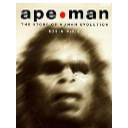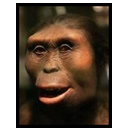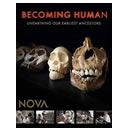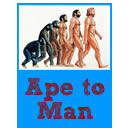The First Human
In February of 2001, a group of British, French and Kenyan scientists announced a breakthrough discovery. An earlier excavation in Kenya had unearthed a series of bones believed to belong to our earliest human ancestors. The enormous implications of this discovery are explored in the exciting documentary The First Human.
Scientists went about the painstaking task of analyzing this impressive scattering of bones and teeth. Through careful study of the fossil properties, and of the region in which they were found, they reached a startling conclusion. These were the oldest human bones ever recorded in archeological history, and they could revise our long accepted views on the development of our species.
Understandably, the discovery was met with great skepticism. Perhaps the most famous of all previous discoveries was the skeleton named Lucy. This three million year old ape stood upright on two legs, and served as the basis of our time line for human evolution. The Kenyan bones - which were later given the title of "Millennium Man" - were determined to be twice the age of Lucy.
So began the long quest to further establish the veracity of these findings, and to challenge the understanding of our origins. How did apes manage to change their shape so dramatically, and what circumstances led them to travel upright and assume human form? The film engages wholeheartedly in the minutia of these discoveries. We learn how sediment and magnetic fields can reasonably indicate vast passages of time, how the chemical signatures of teeth betray the foods these early humans consumed, and how the hint of a groove in a femur bone fragment can confirm upright movement. We witness the means by which these bone fragments dictate a species' bodily structure. Drawing upon these observations, engineers construct mechanical recreations of these structures so they can better predict the functionality of early humans.
The First Human shows great respect for the scientific process. It's an arduous effort that calls upon the expertise of great minds from all over the world. The discovery of the "Millennium Man" spotlights the enormous responsibility these scientists face in reaching concrete conclusions, and is a testament to their bravery in challenging the status quo.




complete nonsense.
Incomplete sense.
It is possible for man to regress to a primitive state where his influence and dominance no longer portend towards a brighter future. The two men who will get us there are Jerry Springer and Donald Trump.
VERY outdated information as of 2019. Many important discoveries have happened since this doc changing the view of human evolution. Clearly part of our evolutionary past but certainly not what you would call a direct ancestor. Either read or view more recent research/docs rather than take this doc at face value.
Just a bunch of silly nasty apes then and now.
Archaeologists wise I can understand the interest but beyond that, for me, it's not worth the time to get caught up in all of this beyond a general fascination.
I wish more people would be concerned with the fact they exist, consciously, right now in this moment! Most people have yet to discover this fact much less anything concerning "x" number of years ago.
With the unfortunate amount of hate and division in the world this subject sadly just seems to add fuel to the fire.
We are all one and it makes no difference at all where we came from , we are here now on this planet together!
Twice as old as Lucy! Mind boggling! I look forward to learning more about Millennium Man. And was it a man or a maid?
How awe-inspiring! Thank you. Joyce.